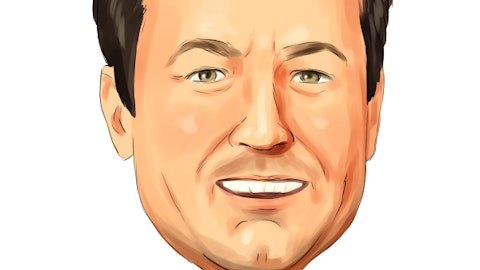Richard Hough: Just normal expenses in life. There’s always a leak in the bucket in this business. Some of the outflows were due to pension funds that may be winding down. And so, you kind of see — you see a drip out for that. Some of it’s the normal high net worth living. This is why it’s — in this business, you’ve always got kind of two steps forward one back. Obviously, early in the year, both in the third quarter and — in the second quarter, we saw very large outflows primarily for taxes, right? There were some events that caused significant tax outflows. Outputs this quarter were pretty moderate. It wasn’t unusual one way or the other. It’s — sometimes we have a little positive there. Very often, it’s a low negative, which is what this quarter was.
So, I can’t give you much color beyond that. On the closed account basis, it was very low. In fact, it was quite low this entire year. It was one of the lowest years that we’ve had for closed accounts since 2017 and 2014. So, we did really well on that basis in terms of the number of accounts that we’ve maintained or relationships we’ve maintained, one of our best years in the past five. And since we’re talking about flows, it was a very good new business, new relationship quarter at $220 million. It was certainly the best quarter of last year and the year as a whole for new relationships, regardless of some of the net — in outflows, but for new relationships, was actually better than 2017 or 2018 or 2019. 2019 looks a bit distorted because that was the year of the Cortina merger.
If you take out acquired assets from that the 2022 is actually better for new relationships than all of those years. So, I would argue pretty solid, especially in the environment.
Chris Sakai: Okay. Thanks. Thanks for the answers.
Richard Hough: You’re welcome.
Operator: The next question comes from Timothy Call with VTAG Capital Management Corporation. Please go ahead.
Timothy Call: Yeah. That’s The Capital Management Corporation. So, your balance sheet is very clean. Your cash and receivables almost equal, all of your liabilities combined. And with your cash being more than 10 times your draw on your credit line, I was wondering why you’re not interest income — net interest income positive? I would have expected that versus rising net interest expense.
Scott Gerard: Yeah. I mean, we do have some of our cash invested to get some yield on it. We don’t typically tie up our cash too long when we have strategic initiatives and uses for the cash. We also do receive some meaningful, what I would call, income credits from our bank which helps reduce any banking fees that we need for our transactions. But strategically, that is definitely something that we look at and we weigh based on our strategic needs for our cash.
Timothy Call: Maybe putting half the cash in the money market would make you that interest composite.
Scott Gerard: Yeah. Thank you.
Timothy Call: It looks great. Good balance sheet. And can you comment on when you — what factors go in your decision making for when you buy back stock?
Richard Hough: Yeah. I’ve talked about this a bit in the past. I appreciate the question. It’s primarily weighing the discussions that we’re having in the marketplace and opportunities where significant cash maybe needed against our ability or desire to purchase one of the highest quality asset managers we can, which would be ourselves. You never know when one of those things are going to hit. And I think the acquisition we made in 2019 when we joined forces with Cortina is a great example, that was a good prolonged discussion. It takes us a while to get to know teams that we want to join with. The cultural aspect is very important. So, we’re very careful about those conversations. And it was the biggest merger in our history and required significant cash for us to step up and do all of a sudden.



